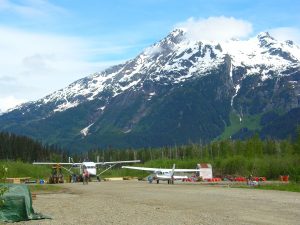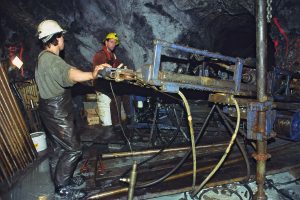Economic Outlook
Moon richer in metals than previously thought — NASA
Posted by Cecilia Jamasmie
on Monday, 6 July 2020 8:00
Plans to start mining the Moon as early as 2025 became more attractive this week after a US National Aeronautics and Space Administration (NASA) team found evidence that the Earth’s natural satellite may, underneath its surface, be richer in metals than previously thought.
Using data from the Miniature Radio Frequency (Mini-RF) instrument onboard NASA’s Lunar Reconnaissance Orbiter (LRO), a team of researchers came to the conclusion that the lunar subsurface contains higher concentration of certain metals, such as iron and titanium, than estimated. The study, published in the journal Earth and Planetary Science Letters, contends the most popular theory surrounding the Moon’s origins. The hypothesis contends the satellite was formed when a Mars-sized object collided with Earth, vaporizing large portions of the Earth’s upper crust…CLICK for complete article
83 Tons Of Fake Gold Bars: Gold Market Rocked By Massive China Counterfeiting Scandal
Posted by by Tyler Durden
on Tuesday, 30 June 2020 7:05
Over the years, we have periodically reported of the occasional gold bar discovered as counterfeit in Manhattan’s Diamond District which instead of containing the yellow precious metal would be filled with gold-plated tungsten or in some cases copper. The news would spark a brief wave of outrage, prompting physical gold holders to run ultrasound spot checks of their inventory, at which point interest would wane and why not: buyer, after all, beware in gold as in every other market, and if someone is spending thousands to buy fake gold, well that’s Darwinism in action.
Yet one market which seemed stubbornly immune to any counterfeiting was that of physical gold in China, which was odd considering that over the past decade China had emerged as the world’s biggest counterfeiter of various, mostly industrial metals used to secure bank loans, better known as “ghost collateral“, and which adding insult to injury, would frequently be rehypothecated meaning often several banks would have claims to the same (fake) asset.
All that is about to change with the discovery of what may be one of the biggest gold counterfeiting scandal in recent history. And yes, not only does it involve China, but it emerges from a city that has become synonymous for all that is scandalous about China: Wuhan itself.
Big Fat Idea – How to Make Money in Exploration Stocks
Posted by MoneyTalks Editor
on Monday, 22 June 2020 12:56
Brad Cooke joins Michael to talk about how to build – and invest in – a successful mineral exploration company.
Central Banks Continue to Buy Gold
Posted by Alex Deluce
on Wednesday, 17 June 2020 6:55
As central banks around the world continue to print endless amounts of money to try to keep financial assets afloat, they also continue to add to their gold position. In April, central banks globally added another 31.6 tons of gold to their reserves.
Even though the net gold purchases by central banks have slowed down when compared to last year, the World Gold Council expects demand continue over the next 12 months. According to the 2020 Central Bank Gold Reserves survey, 20% of central banks intend to increase their gold reserves over the next 12 months, compared to just 8% of respondents in the 2019 survey. The increase is particularly notable as central bank buying has reached record levels in recent years, adding around 650 tons in 2019 alone.
So far during 2020, central banks have added a net 142 tons of gold to their reserves. In 2019, central banks purchased 650.3 tons which represented the second highest level of annual purchases in 50 years, which was only a little bit lower then the record in 2018, which was net purchases of 656.2 tons…CLICK for complete article
It’s All About Grade
Posted by MoneyTalks Editor
on Wednesday, 10 June 2020 9:32
The steady increase in the price of gold since mid-2018 has been a boon to many precious metals investors; those who own physical gold, gold ETFs and senior gold producers being the most obvious.
But the implications for the precious metals industry as a whole are more wide-spread. The big question miners and investors alike are asking is – where will the next generation for profitable gold mines come from? The short answer is exploration companies.
One key determining factor for undeveloped gold deposits to become commercially feasible is payable grades, which really puts emphasis on grades and recoveries:
• A prospective ore deposit can have higher than average concentrations of gold
• Or the processing of an ore deposit results in higher than average recovery of gold
As this gold bull market picks up speed, well-known, high grade, previously discovered gold deposits become more and more attractive, driving their value significantly higher. When gold was below $1350 for much of the period between 2013 and 2018 – a period of falling gold prices but rising operating costs – many good quality, pre-development companies and deposits went on hold because the numbers just didn’t work.
Enter Canarc (TSX: CCM). Their New Polaris Gold Mine Project in British Columbia is one such example. New Polaris was discovered in the early 1990’s and became known as Western Canada’s highest-grade undeveloped gold resource to an entire generation of miners and investors.

In early 2019, Canarc updated its Preliminary Economic Assessment (PEA) of the New Polaris project using bear market numbers and a “game changing”, commercially available process to boost recoveries and reduce costs. Notably, the same process used to recover gold at Kirkland Lake’s Fosterville Gold Mine.
The new numbers were robust. Using an economic model at $1300 per/oz gold and a $0.77 Cdn/US exchange rate, the after-tax internal rate of return (IRR) and net present value (NPV) were 38% and USD$216 million respectively. Good, but not enough to set the market on fire at the time.
Fast forward a year, Canarc recently updated it’s still-compliant PEA, this time using $1500 gold, a $0.71 exchange rate, and lower cash operating costs for the economic model. New Polaris now runs an IRR of 56% and an NPV of USD$333 million. Perhaps no surprise that the stock has traded up on volume in recent weeks!
“It’s imperative to recognize that our business in cyclical,” said Canarc Chairman Bradford Cooke. “And more importantly, to know where we are in the cycle and when it is running in our favour. Now is the time to convert our long-term investment in discovering and evaluating New Polaris into Western Canada’s next great gold mine.”

Other Canadian pre-development projects that have returned to the front burner in recent months with updated PEA’s include Seabridge Gold’s (TSX:SEA) flagship KSM project – also in British Columbia, and ATAC’s (TSX-V:ATC) attractive Tiger deposit on their Rau project in the Yukon.
“It may take some time for these robust new economics to sink in for some analysts and investors,” said Canarc CEO Scott Eldridge. “There is always a bias towards new discoveries. Exciting new finds like Great Bear Resources rightly dominate the headlines. But at the end of the day, grade is king, and Canarc owns one of the best. We can create real value for our shareholders by advancing this high-grade gold deposit to feasibility.”
Ultimately, the new bull market for gold, coupled with fewer quality gold mine projects available to develop, suggests that keen investors may find more profitable opportunities beyond physical gold, ETFs and senior producers. Especially as those options become priced past reasonable valuations. Re-visiting some of the highest grade, well-known, undeveloped projects held by exploration companies may be a great place to start.
-
I know Mike is a very solid investor and respect his opinions very much. So if he says pay attention to this or that - I will.
~ Dale G.
-
I've started managing my own investments so view Michael's site as a one-stop shop from which to get information and perspectives.
~ Dave E.
-
Michael offers easy reading, honest, common sense information that anyone can use in a practical manner.
~ der_al.
-
A sane voice in a scrambled investment world.
~ Ed R.
Inside Edge Pro Contributors

Greg Weldon

Josef Schachter

Tyler Bollhorn

Ryan Irvine

Paul Beattie

Martin Straith

Patrick Ceresna

Mark Leibovit

James Thorne

Victor Adair



